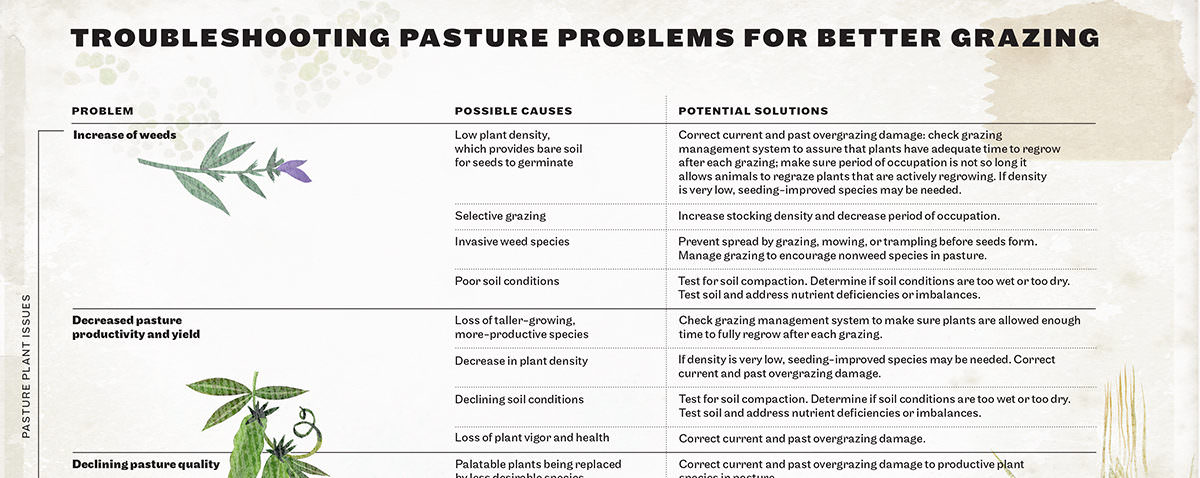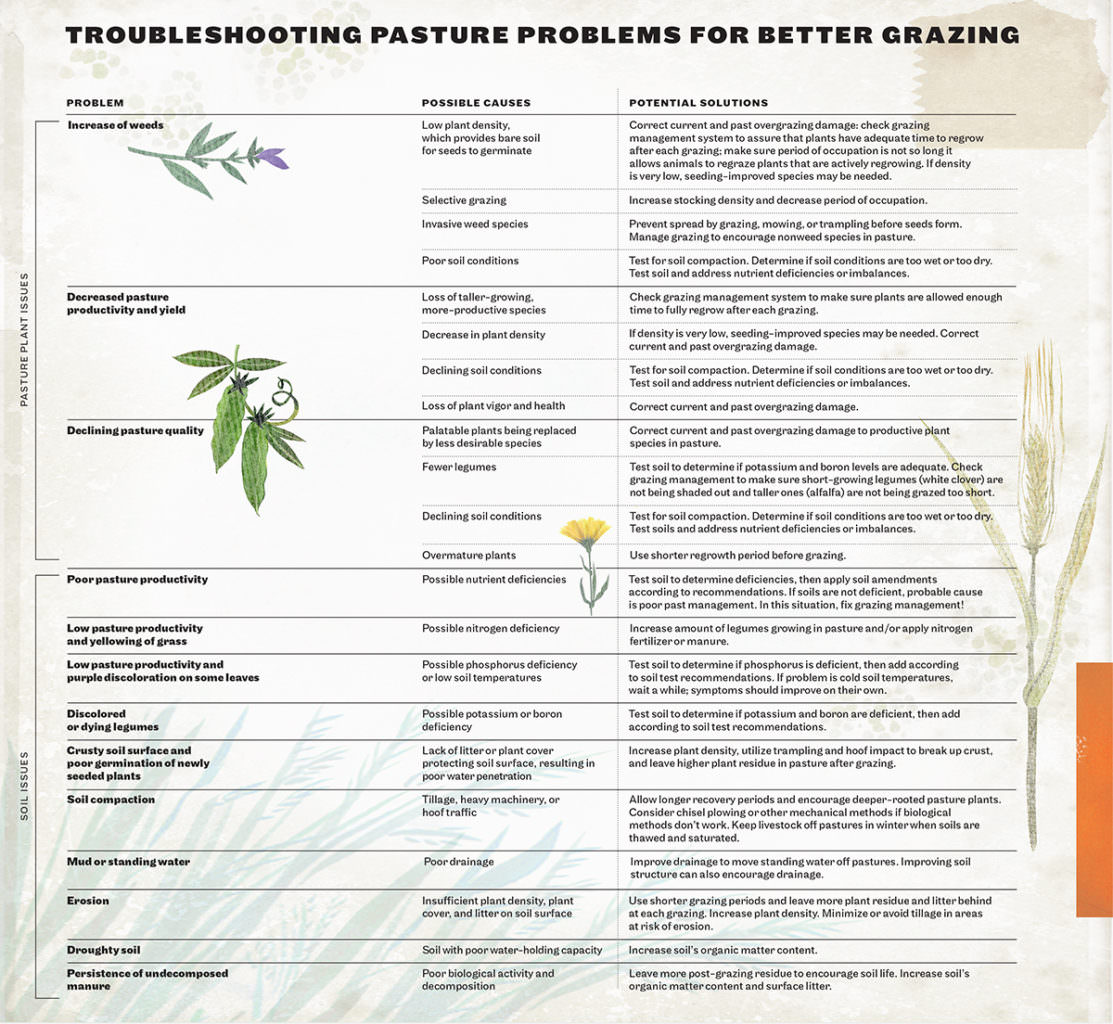Pasture Guru Sarah Flack Shares How to Grow a Better, Greener Pasture
When it comes to grazing livestock, says pasture management guru Sarah Flack, quality forage leads to healthy herds.
Pasture Guru Sarah Flack Shares How to Grow a Better, Greener Pasture
When it comes to grazing livestock, says pasture management guru Sarah Flack, quality forage leads to healthy herds.

Of course Flack’s approach is anti-feedlot, but she doesn’t believe it’s enough to simply turn animals out on the same patch of grass season after season. “Rotational Grazing,” in which livestock is circulated among several paddocks, represents a step up, though it’s not ideal because the pastures’ “recovery periods are kept the same length, even when plant growth slows,” writes Flack. “Pasture quality will decrease each year due to overgrazing damage, increased weeds, and rejected forage.”
Instead, she advocates for the “Management Intensive” method. Despite the intimidating name, the system is basically rotational grazing with the “of course” twist of paying close attention to plant health. Animals are rotated among paddocks more frequently and in a carefully considered way that allows pasture to recover and sprout anew. And livestock isn’t merely grass-fed, but nourished by a diverse mix of annual and perennial grasses (crabgrass, Kentucky bluegrass, fescue), legumes (a category that contains beans, as well as alfalfa and clovers), and forbs (pretty much everything else, including weeds like dandelions).
We’ve excerpted Flack’s detailed diagnostic (below) to help you recognize and address a whole host of problems that can a affect your pasture – and ultimately your animals and the environment. As Flack puts it: “When done well, grass-based livestock farming is a beautiful way to have a positive effect on a parcel of land and on a small part of the planet.”

Follow us
This work is licensed under a Creative Commons Attribution-NoDerivatives 4.0 International License.
Want to republish a Modern Farmer story?
We are happy for Modern Farmer stories to be shared, and encourage you to republish our articles for your audience. When doing so, we ask that you follow these guidelines:
Please credit us and our writers
For the author byline, please use “Author Name, Modern Farmer.” At the top of our stories, if on the web, please include this text and link: “This story was originally published by Modern Farmer.”
Please make sure to include a link back to either our home page or the article URL.
At the bottom of the story, please include the following text:
“Modern Farmer is a nonprofit initiative dedicated to raising awareness and catalyzing action at the intersection of food, agriculture, and society. Read more at <link>Modern Farmer</link>.”
Use our widget
We’d like to be able to track our stories, so we ask that if you republish our content, you do so using our widget (located on the left hand side of the article). The HTML code has a built-in tracker that tells us the data and domain where the story was published, as well as view counts.
Check the image requirements
It’s your responsibility to confirm you're licensed to republish images in our articles. Some images, such as those from commercial providers, don't allow their images to be republished without permission or payment. Copyright terms are generally listed in the image caption and attribution. You are welcome to omit our images or substitute with your own. Charts and interactive graphics follow the same rules.
Don’t change too much. Or, ask us first.
Articles must be republished in their entirety. It’s okay to change references to time (“today” to “yesterday”) or location (“Iowa City, IA” to “here”). But please keep everything else the same.
If you feel strongly that a more material edit needs to be made, get in touch with us at [email protected]. We’re happy to discuss it with the original author, but we must have prior approval for changes before publication.
Special cases
Extracts. You may run the first few lines or paragraphs of the article and then say: “Read the full article at Modern Farmer” with a link back to the original article.
Quotes. You may quote authors provided you include a link back to the article URL.
Translations. These require writer approval. To inquire about translation of a Modern Farmer article, contact us at [email protected]
Signed consent / copyright release forms. These are not required, provided you are following these guidelines.
Print. Articles can be republished in print under these same rules, with the exception that you do not need to include the links.
Tag us
When sharing the story on social media, please tag us using the following: - Twitter (@ModFarm) - Facebook (@ModernFarmerMedia) - Instagram (@modfarm)
Use our content respectfully
Modern Farmer is a nonprofit and as such we share our content for free and in good faith in order to reach new audiences. Respectfully,
No selling ads against our stories. It’s okay to put our stories on pages with ads.
Don’t republish our material wholesale, or automatically; you need to select stories to be republished individually.
You have no rights to sell, license, syndicate, or otherwise represent yourself as the authorized owner of our material to any third parties. This means that you cannot actively publish or submit our work for syndication to third party platforms or apps like Apple News or Google News. We understand that publishers cannot fully control when certain third parties automatically summarize or crawl content from publishers’ own sites.
Keep in touch
We want to hear from you if you love Modern Farmer content, have a collaboration idea, or anything else to share. As a nonprofit outlet, we work in service of our community and are always open to comments, feedback, and ideas. Contact us at [email protected].by Modern Farmer, Modern Farmer
November 8, 2017
Modern Farmer Weekly
Solutions Hub
Innovations, ideas and inspiration. Actionable solutions for a resilient food system.
ExploreExplore other topics
Share With Us
We want to hear from Modern Farmer readers who have thoughtful commentary, actionable solutions, or helpful ideas to share.
SubmitNecessary cookies are absolutely essential for the website to function properly. This category only includes cookies that ensures basic functionalities and security features of the website. These cookies do not store any personal information.
Any cookies that may not be particularly necessary for the website to function and are used specifically to collect user personal data via analytics, ads, other embedded contents are termed as non-necessary cookies.